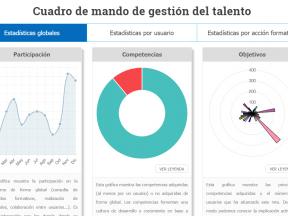Talent Retention Techniques: Knowing to define


A fundamental tool for retaining and improving knowledge, achieving highly motivated work teams and aligning individual strategies with the company’s strategic objectives.
Why manage talent in my company?
If all organizations start from the same point, how can there be so much diversity? Organizations end up being very different from one another depending on the human capital that composes them, as well as the ability of the management team to manage organizational talent and knowledge. Achieving this goal is not easy, indeed, few organizations make efforts to calculate these costs, as many consider them irrecoverable.
To know the costs of replacing professionals in jobs that have been abandoned, to be able to motivate our team to achieve the strategic objectives, to achieve a working climate of collaboration and cogeneration of new knowledge or retaining talent is a major temporary and economic investment.
Not considering these parameters strategically means limiting the growth of any organization, we work in an environment of increasing competitiveness, in which business needs demand innovative and quality solutions and services. To achieve these objectives, we need committed, motivated teams who are open to sharing their knowledge and able to learn and collaborate.
One of the most effective techniques to conserve talent and strengthen knowledge is to develop it, that is, to provide the necessary tools to exploit it in a permanent way creating dynamics of participation and digitisation of knowledge.
Where is talent found?
The components that make out talent are many: experiences, learning, adaptability to change, leadership, proactivity, knowledge, skills and competencies, motivation, vocational interests, personal and social skills, attitudes, petentials, etc. It is a compendium of individual and collective factors which, if we manage to align them whith the expectations, objectives and challenges of an organization will make it possible to achieve their success.
Knowledge in an organisation is not limited to the most "brilliant" professionals, being able to manage the talent of an organization on a collective and individual level with specific training and competency pathways will allow for greater and more reliable sources of knowledge, as well as a climate of collaboration where the objectives to be achieved individually and collectively are perfectly clear.
A multidisciplinary team with different objectives, knowledge and ambitions in a collaborative and connected working environment certainly leads to greater success in transferring knowledge, attitudes and objectives different from a common global strategy.
Why does a Talent Management Scorecard make sense?
In the competitive context in which the organizations are involved, it becomes necessary to coordinate and ultimately know how to exploit the assets that compose them, that is the professionals, who are the learners, innovate and work towards the organisation’s objectives.
There are organizations that intend to take the first steps along this line, as well as others, that have already managed to store a quality, differentiated and scarce human capital, with specific skills and in whose training they have invested money and time. In both cases it is necessary to measure to know the situation at a given moment in our organization and to serve as a basis for taking the appropriate measures.
It is for this reason that the Talent Management Scorecard integrated with eHabilis brings a lot of value to any organization by allowing us to measure parameters of our organization, such as:
- The knowledge acquired by each professional at a given time, detailing their long-term training itinerary and allowing them to know areas of expertise individually and by departments or working groups.
- The competencies and skills acquired by the different professionals and defined by those in charge of the organization through the skills map.
- Proactivity and collaboration in measuring the participation of different professionals in the different working groups, forums or training actions implemented in eHabilis (creating new knowledge, supporting partners, identifying problems, new solutions, needs...)
- The motivation and interests knowing in real time the level of participation in eHabilis of the different professionals in different fields (training, collaboration, support...).
At the same time this Scorecard allows us to have a vision of our organization in three dimensions:
- The global dimension that brings together the entire human team.
- The collective dimension that groups a working group, training department or action.
- The individual dimension allows to know each professional’s interests, competences, knowledge, level of participation, evolution over time...
Ehabilis is designed to foster the growth and development of an organization’s professionals. It is a technological tool that through different functionalities allows to implement the training processes of a corporation, cooperation between professionals and digitization, updating and feedback of knowledge.
The integration of a Talent Management Scorecard allows us to deepen the exploitation of our organization’s data in different fields. We know to define, we know based on objective data to adopt the best strategies in the management of talent, the acquisition of knowledge and generate new value.
